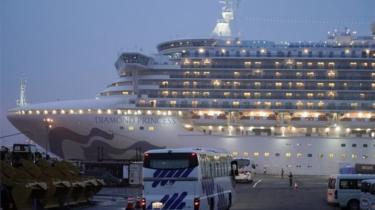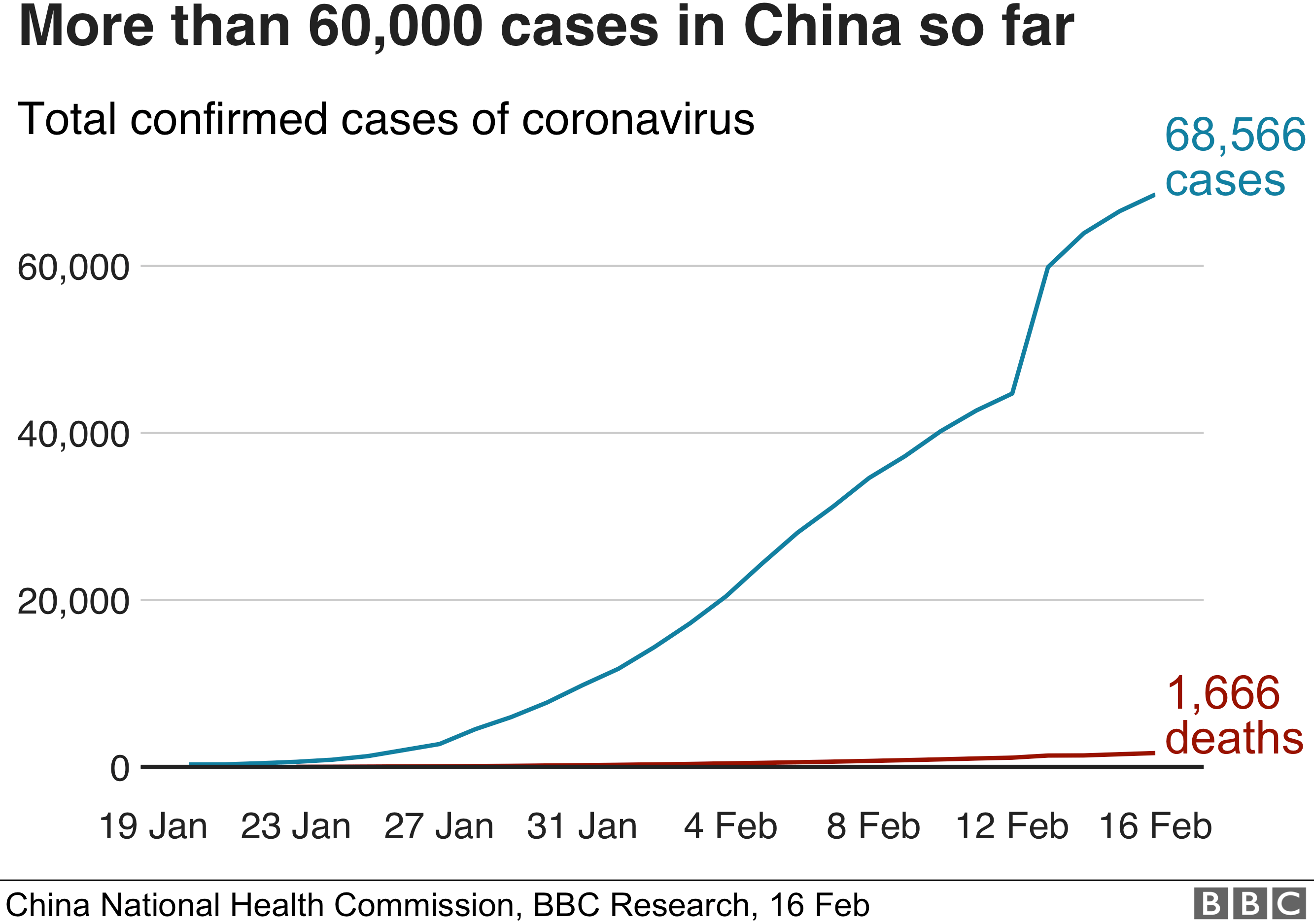China
 EPA
EPA
Forty Americans being taken off the quarantined cruise ship Diamond Princess are infected with new coronavirus, a US official says.
They are among 400 people from the US leaving the vessel docked in Japan.
Most are due to depart for the US on two government-chartered aircraft. But those carrying the virus will be admitted to Japanese hospitals.
Meanwhile, China has tightened restrictions on movement in Hubei province, the centre of the outbreak.
What is happening on the cruise ship?
The Diamond Princess has been quarantined in Japan's port of Yokohama with some 3,400 people on board since 3 February after a man left the ship in Hong Kong and was found to have the virus.
It has the largest cluster of coronavirus cases outside China. The Japanese authorities on Sunday said the number of new cases on board the ship had risen by 70 to 355.
The 40 Americans who are infected will be receive medical treatment in Japan, Dr Anthony Fauci, Director of the National Institute of Allergy and Infectious Diseases told Face the Nation on CBS.
"Others are going to be evacuated, starting imminently, to Air Force bases in the United States," he said.
"If people on the plane start to develop symptoms, they'll be segregated within the plane."
- Are coronavirus tests flawed?
- Watching loved ones die without care in Wuhan
- Why Singapore is so vulnerable to virus spread
Those entering the US will undergo a 14-day quarantine, he added.
"And the reason for that is that the degree of transmissibility, on that cruise ship, is essentially akin to being in a hotspot."
Other evacuation flights will repatriate residents of Israel, Hong Kong and Canada on the ship.
What are the new Hubei measures?
People in the province of 60 million have been ordered to stay at home, though they will be allowed to leave in an emergency. In addition, a single person from each household will be allowed to leave the building every three days to buy food and essential items.
On housing estates, one entrance will be kept open. It will be guarded to ensure that only residents can enter or leave.
All other businesses will stay closed, except chemists, hotels, food shops and medical services.
There will be a ban on the use of private cars, but vehicles used for the delivery of essential goods are exempt.

Meanwhile, authorities in the capital, Beijing, have ordered everyone returning to the city to go into quarantine for 14 days or risk punishment.
China's central bank will also disinfect and store used banknotes before recirculating them in a bid to stop the virus spreading.
What is the latest on cases?
On Sunday, the Chinese authorities reported 2,009 new cases - down from 2,641 on Saturday, and 5,090 the day before.
New cases spiked earlier in the week after a change in the way they were counted but have been falling ever since. In total, more than 68,500 people have so far been infected in China.
National Health Commission spokesman Mi Feng said the figures showed China was managing to curb the outbreak.
"The effects of epidemic prevention and control in various parts of the country can already be seen."
The commission's daily bulletin also reported 142 more deaths nationwide, the vast majority in Hubei.
However Foreign Minister Wang Yi said that along with a drop in infections within Hubei there had been a rapid increase in the number of people who had recovered.

The proportion of infected patients considered to be in a "serious condition" has dropped nationwide from more than 15% to just over 7%, according to China's State Council.
Taiwan has now reported a death from the illness - a taxi driver, 61, who had not travelled abroad recently but had diabetes and hepatitis B, Health Minister Chen Shih-chung said.
The minister said many of his passengers had come from China.
Outside China, there have been more than 500 cases in nearly 30 countries. Four others have died outside China - in France, Hong Kong, the Philippines and Japan.
Meanwhile, a plane carrying 175 evacuated Nepalis, mostly students, has arrived in Kathmandu from Wuhan. It is the latest country to fly its citizens out of Hubei province.
The virus is a new strain of coronavirus and causes an acute respiratory disease which has been named Covid-19.
BBC

.jpeg)
.jpeg)
0 Comments